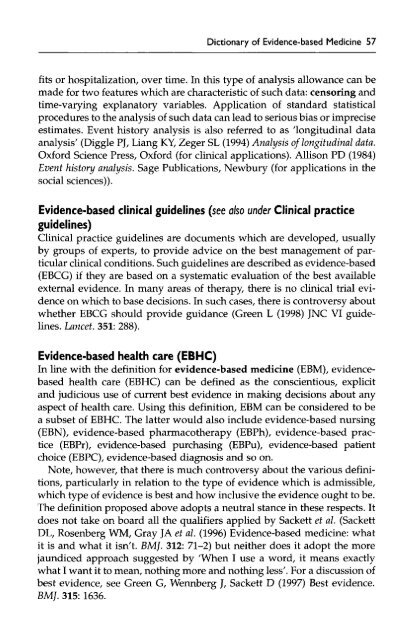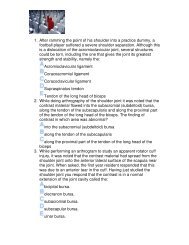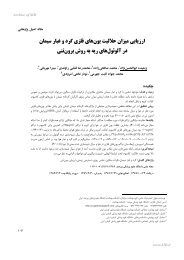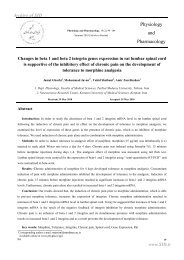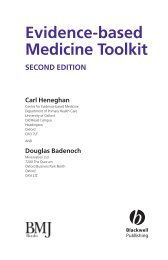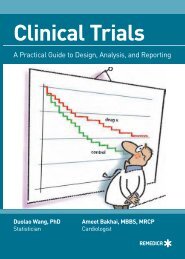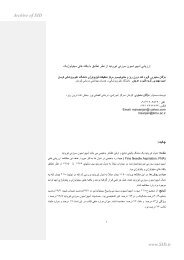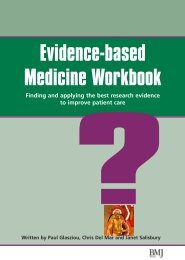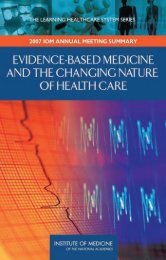Dictionary of Evidence-based Medicine.pdf
Dictionary of Evidence-based Medicine.pdf
Dictionary of Evidence-based Medicine.pdf
You also want an ePaper? Increase the reach of your titles
YUMPU automatically turns print PDFs into web optimized ePapers that Google loves.
<strong>Dictionary</strong> <strong>of</strong> <strong>Evidence</strong>-<strong>based</strong> <strong>Medicine</strong> 57<br />
fits or hospitalization, over time. In this type <strong>of</strong> analysis allowance can be<br />
made for two features which are characteristic <strong>of</strong> such data: censoring and<br />
time-varying explanatory variables. Application <strong>of</strong> standard statistical<br />
procedures to the analysis <strong>of</strong> such data can lead to serious bias or imprecise<br />
estimates. Event history analysis is also referred to as 'longitudinal data<br />
analysis' (Diggle PJ, Liang KY, Zeger SL (1994) Analysis <strong>of</strong> longitudinal data.<br />
Oxford Science Press, Oxford (for clinical applications). Allison PD (1984)<br />
Event history analysis. Sage Publications, Newbury (for applications in the<br />
social sciences)).<br />
<strong>Evidence</strong>-<strong>based</strong> clinical guidelines (see a/so under Clinical practice<br />
guidelines)<br />
Clinical practice guidelines are documents which are developed, usually<br />
by groups <strong>of</strong> experts, to provide advice on the best management <strong>of</strong> particular<br />
clinical conditions. Such guidelines are described as evidence-<strong>based</strong><br />
(EBCG) if they are <strong>based</strong> on a systematic evaluation <strong>of</strong> the best available<br />
external evidence. In many areas <strong>of</strong> therapy, there is no clinical trial evidence<br />
on which to base decisions. In such cases, there is controversy about<br />
whether EBCG should provide guidance (Green L (1998) JNC VI guidelines.<br />
Lancet. 351: 288).<br />
<strong>Evidence</strong>-<strong>based</strong> health care (EBHC)<br />
In line with the definition for evidence-<strong>based</strong> medicine (EBM), evidence<strong>based</strong><br />
health care (EBHC) can be defined as the conscientious, explicit<br />
and judicious use <strong>of</strong> current best evidence in making decisions about any<br />
aspect <strong>of</strong> health care. Using this definition, EBM can be considered to be<br />
a subset <strong>of</strong> EBHC. The latter would also include evidence-<strong>based</strong> nursing<br />
(EBN), evidence-<strong>based</strong> pharmacotherapy (EBPh), evidence-<strong>based</strong> practice<br />
(EBPr), evidence-<strong>based</strong> purchasing (EBPu), evidence-<strong>based</strong> patient<br />
choice (EBPC), evidence-<strong>based</strong> diagnosis and so on.<br />
Note, however, that there is much controversy about the various definitions,<br />
particularly in relation to the type <strong>of</strong> evidence which is admissible,<br />
which type <strong>of</strong> evidence is best and how inclusive the evidence ought to be.<br />
The definition proposed above adopts a neutral stance in these respects. It<br />
does not take on board all the qualifiers applied by Sackett et al. (Sackett<br />
DL, Rosenberg WM, Gray JA et al. (1996) <strong>Evidence</strong>-<strong>based</strong> medicine: what<br />
it is and what it isn't. BMJ. 312: 71-2) but neither does it adopt the more<br />
jaundiced approach suggested by 'When I use a word, it means exactly<br />
what I want it to mean, nothing more and nothing less'. For a discussion <strong>of</strong><br />
best evidence, see Green G, Wennberg J, Sackett D (1997) Best evidence.<br />
BMJ. 315: 1636.


